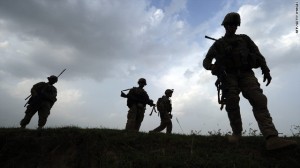 In his address to the nation President Obama laid out his plan for a troop withdrawal in Afghanistan, "assuring the nation that 33,000 U.S. troops will be pulled out by the autumn of 2012. Five thousand troops will be pulled out immediately, with another 5,000 leaving at the end of 2011."
In his address to the nation President Obama laid out his plan for a troop withdrawal in Afghanistan, "assuring the nation that 33,000 U.S. troops will be pulled out by the autumn of 2012. Five thousand troops will be pulled out immediately, with another 5,000 leaving at the end of 2011."Obama's speech focused on foreign policy and America's pursuit of a righteous path in the Middle East in the last decade of wartime. But what really needs to be addressed is how America will deal domestically with the issues faced by returning soldiers and veterans from this war.
The mental and emotional well-being of our armed forces has never been in worse condition. 2009 and 2010 saw record highs for suicide rates among the military personnel of the Afghan and Iraq wars - by November of 2009 there were more soldier casualties from suicides than there was from the actual Afghan war itself (334 suicides vs. 319 killed in battle in Afghanistan). Reasons for soldiers trying to kill themselves range from financial hardships to relationship breakdowns to substance abuse and traumatic events.
For the soldiers that have returned home, the statistics don't look much better: about 15% of Iraq and Afghanistan veterans between the ages of 20-24 are unemployed, and in some states they are finding that these returned veterans make up over half of the homeless population in some cities. Homelessness among veterans will likely rise as more soldiers return home and are unable to meet the added burdens of civilian life.
We need to make sure America's considerable Military budget starts going toward programs of rehabilitation and compensation for Iraq and Afghan veterans. V.A. Undersecretary Allison Hickey should be preparing to expand the scope and funding of VA benefits - from education programs, to guaranteed home loans, to vocational rehabilitation and employment services, and military life insurance programs.
Perhaps most important though is making sure that these programs are prepared to thoroughly address the devastating issue of Post-Traumatic Stress Disorder (PTSD) in armed service personnel and that they work toward solutions of therapy, recovery, and healing. It is estimated that somewhere between 20-30% of veterans suffer from PTSD, which hinders their ability to hold down jobs, maintain relationships, overcome substance abuse and, in some cases, maintain their will to live. 47% of veterans with PTSD have reported having suicidal thoughts, with 3% admitting to having attempted it. We know that if we neglect to take care of the veterans returning from the war in Afghanistan, the suffering and consequences will be detrimental.
By one estimate there are 294,000 Iraq and Afghanistan war veterans with PTSD that will be returning home after the war has ended. That's nearly 300,000 reasons for America to begin seriously investing in mental health, therapeutic, and rehabilitation programs for these veterans before it is too late.